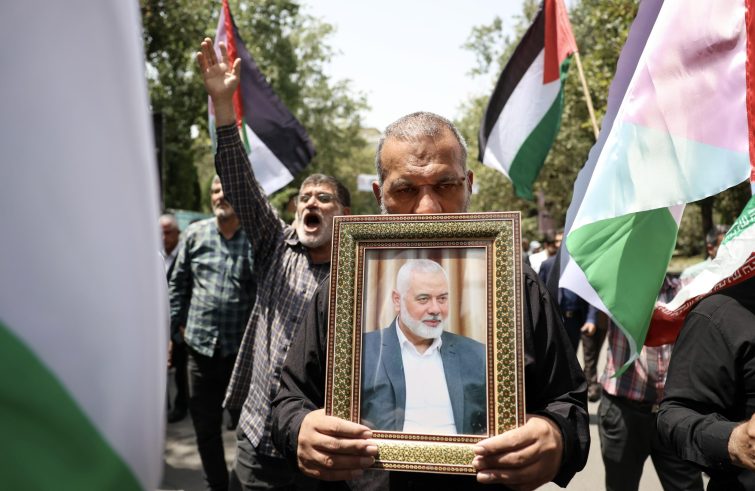
The political leader of Hamas, Ismail Haniyeh, was killed in an Israeli air strike in Tehran on Tuesday night. He was there to attend the swearing-in ceremony of President Massoud Pezeshkian. Haniyeh had been head of Hamas’ political bureau since 2017. He had served as the Palestinian Authority’s prime minister from 2006-2007 and leader of the Gaza Strip administration from 2014 to 2017.
SIR interviewed Claudio Bertolotti, an expert at the Italian Institute for International Political Studies (ISPI) and director of Start InSight, to discuss the implications of this death for the Hamas-Israel conflict in Gaza and the future of the Islamist movement.
What are the political and military implications of the elimination of Ismail Haniyeh?
It represents the political decapitation, albeit temporary, of the Hamas organization, and a great success for Israel. Haniyeh was, in fact, a leader who had long held the key positions in the Islamist movement and who had imposed himself as a link between Hamas and Iran, which provided support to the Palestinian movement in recent years, especially after 7 October.
This is also a great victory for Israel in terms of public image.
Benjamin Netanyahu’s oft-stated goal was the elimination of Hamas’s political leadership, and this is an outcome that the Israeli Prime Minister will ultimately present to Israeli public opinion. The elimination of Haniyeh, on the other hand, is bound to intensify Palestinian public hostility against Israel.
What does this death mean for Hamas?
Ismail Haniyeh’s death is a temporary political setback for Hamas.
Hamas’ organisation is structured as a shura, i.e a supreme assembly with many voices, many currents, and therefore many actors ready to replace the leaders who could be eliminated. From the Palestinian hierarchy, figures such as Mahmoud al-Zahar (one of the founders of the terrorist group, Ed.’s note), a long-established leader with good relations both with Palestinian actors abroad and with those still present in Gaza, could now rise to prominence.
Will the death of the Hamas leader have an impact on the ongoing war in Gaza?
I don’t believe that it will. It is the Ezzedin al-Qassam Brigades, not the political authority, that has military control over Hamas’ capabilities in Gaza. Instead, I would expect Hamas to try to carry out symbolically significant retaliatory attacks for the purposes of its narrative and propaganda. It would also help reassert some dominance over the many other militias operating in Gaza, such as Islamic Jihad, which is a minor player at the moment.
All the other militia groups currently operating in the shadow of the Islamist movement view a military weakening of Hamas with some caution. A scenario of internal rivalry could also unfold, with Fatah ready to fill any vacuum left by Hamas.
Haniyeh was one of the main negotiators for the hostage release and exchange deal with Palestinian prisoners held in Israeli jails. How will his death affect the fate of the hostages?
I have my doubts that there will be a direct impact. Of course, much will depend on who is responsible for the movement’s political leadership, especially for Hamas’ foreign affairs. Let us not forget that Hamas consists of two entities. There are those in charge of governing, or at least managing and coordinating the war in Gaza, and those who represent the movement abroad. The handling of prisoners is both a political and a very practical matter, and is conducted by those in charge inside Gaza. Much will therefore depend on the relationship established between the military wing of Hamas, the Ezzedin al-Qassam Brigades, and the political wing of the movement.
Haniyeh’s assassination in Tehran comes only a few days after the assassination in Beirut of senior Hezbollah commander Fuad Shukr, whom Israel blames for the massacre of children in the Druze village of Majdal Shams, and of many more Israeli civilians. Could these killings bring Hamas closer to Iran and its proxies, and further prepare the ground for an all-out escalation of the conflict in Gaza?
Relations between Iranian proxies at the regional level could not be consolidated any further than they already are. Indeed, they are at a very advanced stage. But in this case, a worst-case scenario could emerge as a result of more coordinated action by all concerned parties under Iranian leadership. As regards Israel, these punitive but preventive actions are aimed at weakening the leadership of the various factions – Hamas, Hezbollah, Shia militias in Syria and Iraq – and their military and political capabilities. These are pre-emptive and markedly stronger actions supported by the American administration, both the Democrat and Republican camps.










